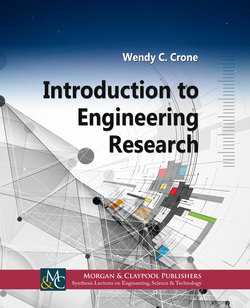Читать книгу Introduction to Engineering Research - Wendy C. Crone - Страница 10
На сайте Литреса книга снята с продажи.
ОглавлениеPreface
Both research as an undergraduate and the transition into research as a first-year graduate student is unlike most of the coursework and school experiences that one has had prior to entering into such an undertaking. Although we carry our technical expertise with us, there are often gaps in knowledge. Additionally, the research enterprise itself is foreign. Without the proper guidance and support, many students flounder and struggle to set themselves on a successful course. This seems wasteful of people’s time, disheartening to the individuals involved, and ultimately adds to the attrition seen in graduate programs.
Several years ago, I co-authored an article on topics important to the broader context of engineering research based on an undergraduate course in engineering research developed at the University of Wisconsin–Madison.1 Additionally, summer undergraduate research experiences at campuses and national laboratories have developed accompanying workshops,2,3,4 courses,5,6 and even “boot-camp” experiences7 that help students to find and understand the scientific literature, appreciate the societal impact of engineering research responsible conduct of research, communicating research findings, research careers, and the graduate school application process. This broader training outside the of the specific research experience has been long advocated by the Council on Undergraduate Research as critical to “socializ[ing] students in the research laboratory culture.8”
The semester-long Introduction to Engineering Research course developed for the Engineering Physics undergraduate degree program and taught at University of Wisconsin–Madison addressed the topic above as well as the importance of diversity in research, research collaboration, safety, and intellectual property. This course was later adapted and implemented at Washington State University and University of Central Florida in a National Science Foundation funded effort. The evaluation of the implementations on their campuses showed that “there was a measurable increase in the understanding of undergraduate research in the students at all institutions.9” The subsequent work performed showed that the mode of delivery did not influence the student outcomes. “Similar gains in conceptual awareness between each course format and at each institution” were shown with a one-week faculty-led boot camp, a three-day peer mentor-led course, and a semester-long faculty-led course.10 Thus, I believe that the usage of the content provided in this book can be successfully adapted to a number of different delivery modes.
I wholeheartedly agree with the assessment of Schneider et al. that “By introducing students to the nuances of the research environment, we believe that preresearch courses reduce barriers to involvement and provide confidence and knowledge for all students who participate.11” In our evaluations of the Engineering Physics degree program at the UW–Madison, upon which this book is based, the students who completed the program rated their research confidence and skill levels highly. The majority of students felt that they were able to make contributions to a research team, explain their research topic to other engineers as well as non-engineers, document their research, provide their peers with constructive feedback on their research projects, and identify research misconduct issues. They also reported that they gained skills in conducting a literature search, understanding journal papers, conducting a research project, working both independently and collaboratively, utilizing scientific method, dealing with setbacks, giving and receiving feedback, presenting information, and articulating questions.
These topics are also highly relevant to the first-year graduate student. Even if a student has had a prior undergraduate research experience, revisiting topics can lead to deeper understanding and further skill development. My goal is that students using this book, either independently or while engaged in a research professional development program/course, will be able to gain the skills they need to be successful and achieve a high level of confidence in their research capabilities.
Wendy C. Crone
February 2020
1Cadwell, K., Crone, W., 2008. Training undergraduates in the broader context of the research enterprise, ASEE Annual Conference and Exposition, Conference Proceedings, 1364, 1–9.
2The Undergraduate Research Center for Sciences, Engineering and Mathematics and the Center for Academic and Research Excellence, University of California at Los Angeles, http://college.ucla.edu/urc-care/. Accessed January 2008.
3Wilson, R., Cramer, A., and Smith, J. L., 2004. Research is another word for education, from Reinvigorating the Undergraduate Experience: Successful Models Supported by NSF’s AIRE/RAIRE Program, L. R. Kauffman and J. E. Stocks, Eds., Council on Undergraduate Research, Washington, DC.
4The University of Washington Undergraduate Research Program. http://www.washington.edu/research/urp/, accessed January 2008.
5The University of Virginia Department of Science, Technology, and Society Undergraduate Thesis Project, http://www.sts.virginia.edu/stshome/tiki-index.php?page=Undergraduate+ Thesis accessed January 2008.
6Katkin, W., 2004. The integration of research and education: A case study of reinventing undergraduate education at a research university, from Reinvigorating the Undergraduate Experience: Successful Models Supported by NSF’s AIRE/RAIRE Program, L. R. Kauffman and J. E. Stocks, Eds., Council on Undergraduate Research, Washington, DC: 2004.
7Bahr, D. F. and Findley, K. O., 2007. An intensive ‘camp’ format to provide undergraduate research experiences to first year students. Materials Research Society 2007 Fall Meeting: Session W4: Implementing New Course Materials and Strategies, November 28.
8Merkel, C. A. and Baker, S. M., How to Mentor Undergraduate Researchers, Council on Undergraduate Research, Washington, DC, 2002.
9Burkett, S. L., Lusth, J. C., Bahr, D., Pressley, S., and Schneider, K., 2013. Three training programs for preparing undergraduates to conduct research. Proc. American Society for Engineering Education Annual Conference, Atlanta, GA.
10Schneider, K. R., Bahr, D., Burkett, S., Lusth, J. C., Pressley, S., and VanBennekom, N., 2016. Jump starting research: Preresearch STEM programs. Journal of College Science Teaching, 45(5), p. 13.
11Schneider, K. R., Bahr, D., Burkett, S., Lusth, J. C., Pressley, S., and VanBennekom, N., 2016. Jump starting research: Preresearch STEM programs. Journal of College Science Teaching, 45(5), p. 13.
